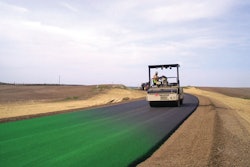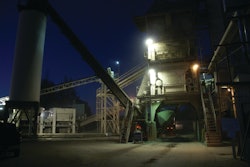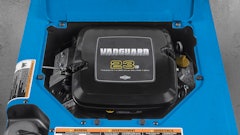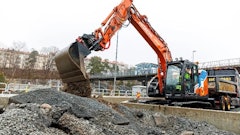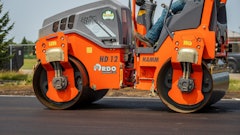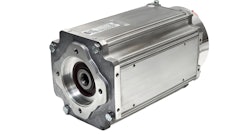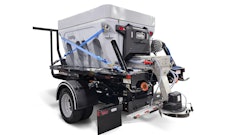Asphalt is the most commonly used pavement material throughout the world for roads, parking lots, airport taxiways, runways and tarmacs. Although it has many advantages, asphalt does have one critical weakness: its surface integrity.
UV and rainwater intrusion cause oxidation, which makes asphalt surfaces become brittle, crack, and exhibit various distresses like rutting, friction loss and loose aggregate. Asphalt is also damaged by de-icing products and automotive fluids.
For years the asphalt industry has searched for ways to improve the longevity of asphalt. Both the Federal Highway Administration and state Departments of Transportation (DOT) are stressing the need for asphalt to become a more long-term asset. But that has been an almost impossible challenge with the escalation of oil prices, the decreased availability of aggregates and petroleum-based products, and a decrease in state and municipal budgets.
Asphalt is the most commonly used pavement material throughout the world for roads, parking lots, airport taxiways, runways and tarmacs. Although it has many advantages, asphalt does have one critical weakness: its surface integrity.
UV and rainwater intrusion cause oxidation, which makes asphalt surfaces become brittle, crack, and exhibit various distresses like rutting, friction loss and loose aggregate. Asphalt is also damaged by de-icing products and automotive fluids.
For years the asphalt industry has searched for ways to improve the longevity of asphalt. Both the Federal Highway Administration and state Departments of Transportation (DOT) are stressing the need for asphalt to become a more long-term asset. But that has been an almost impossible challenge with the escalation of oil prices, the decreased availability of aggregates and petroleum-based products, and a decrease in state and municipal budgets.
Asphalt pavements at airports and parking areas or mixed-use pedestrian and bike areas have traditionally been sealed with various sealers such as coal tar and asphalt-based sealcoats. The presence of polycyclic aromatic hydrocarbons (PAHs), which are suspected human carcinogens, presents a serious environmental problem. Asphalt also produces unwanted urban heat islands, and its dark surface color creates a nighttime illumination problem.
The solution?
E-Krete, a pavement preservation product, is created, manufactured and distributed by PolyCon Manufacturing. E-Krete is an extremely durable polymer composite micro-overlay (PCMO) that bonds securely to asphalt pavement, chip seal, polished stone and other bituminous products, as well as concrete and primed metal.
E-Krete is unaffected by water, UV, ice, oxidation, automotive fluids, aircraft fluids, oil, diesel and gasoline. Cracks in oxidized pavement are filled by the PCM material as the asphalt pavement is capped with a 1/8-inch lift of E-Krete.
Since 1997, the E-Krete PCMO has been tested and used on roads, regional and military airports, offshore helidecks and parking lots. It is the only cementitious pavement preservation material approved by the FAA, EPA, Army Corp of Engineers, and is currently in the approval process in several state DOTs including Missippi, Louisiana, Alabama, Arkansas, Texas, Tennesse and Florida.
The next generation of preservation
The federal government, state DOTs, counties and municipalities are all seeking a "next generation" pavement preservation system, and public-funded contracts are asking for warranties and/or maintenance contracts to control expenses.
The rising cost of oil and decrease in supplies of aggregates and raw materials used by asphalt producers further emphasizes the need for a product like E-Krete.
With PolyCon's 10-year warranty, E-Krete extends the life of asphalt pavement in excess of 20 years, and protects the investment that county and municipal governments have made in their roads.
DOTs, counties and municipalities, on the average, are paving 275,000 miles of roads annually in the United States. According to PolyCon, a life-cycle cost analysis shows E-Krete can save state, municipal and county governments in excess of $70,000 per mile over a 12-year period.
Benefits of E-Krete
E-Krete is recommended for asphalt and chip seal roads, taxiways and tarmacs, parking lots, interstate bridge decks, heli-ports, off-shore oil rigs, barge decks, highly oxidized asphalt pavements, and any area where a high coefficient of friction is needed.
E-Krete is designed to provide a clean, high-quality, quiet-riding, skid-resistant surface that arrests the deterioration of asphalt pavement caused by UV and rainwater intrusion. Other benefits include:
- Not effected by water, snow melt, rainfall, and automotive fuels;
- No prefilling of cracks - E-Krete PCMO automatically fills the cracks (up to 1/2-inch wide) as it places a protective cap on the existing asphaltic material;
- Can be applied directly over old chip seal or other resurfacing products and will eliminate the loose rock problem that causes broken windshields associated with chip seal. It also bonds to itself when maintenance patching is required. The thin 1/8-inch thickness eliminates many grade transitions, the required milling associated with utility adjustments, or curb and gutter issues;
- Can be rapidly installed on damaged substrates, and depending on the temperature, allows the return of the pavement to service in one hour, in most cases;
- Provides a long-lasting, high friction wearing course through the integration of graded aggregates into the surface material; can also provide new asphalt surfaces with a high friction-wearing surface;
- No odor or tracking issues;
- Can be applied to new asphalt as soon as two weeks;
- Will arrest deterioration and cracking of "old" asphalt as long as the structure is adequate and stable;
- Provides an SRI (Solar Reflectivity Index) that meets and exceeds the requirement for LEED projects, according to the National Center for Asphalt Technology (NCAT) at Auburn University. E-Krete reduces the heat by as much as 12 degrees F compared to the heat which is absorbed;
- Is 100-percent environmentally safe. Unlike traditional sealcoating materials that contain polycyclic aromatic hydrocarbons (PAH), E-Krete has no PAHs and is recognized by the EPA as "reducing the need for resurfacing, sealing and replacement … thus eliminating the generation and release of PAH, coal tar materials, and hazardous solvents into the environment."





